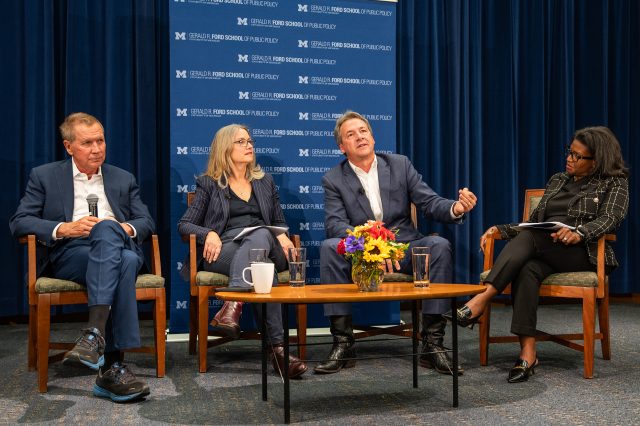[ad_1]
More than 100 University of Michigan students and community members gathered in Annenberg Auditorium for a conversation between John Kasich, former Republican governor of Ohio, and Steve Bullock, former Democratic governor of Montana. The conversation was moderated by Celeste Watkins-Hayes, dean of the Ford School of Public Policy, along with Jenna Bednar, professor of political science and public policy. The former governors discussed political polarization, the 2020 election and the importance of state governments in policymaking.
Kasich, a self-described moderate Republican, was first elected to the United States House of Representatives in 1982 and served for 18 years before he was elected as the 69th governor of Ohio in 2011. Left of the political aisle, Steve Bullock served two terms as Montana’s governor from 2013 to 2021 after serving as Montana’s attorney general for four years.
Daniel Rivkin, senior public affairs manager at the Public Policy School, said it is important to have conversations between moderates in an increasingly polarized country.
“The idea of having two governors talking about this — we thought — was relevant because even in divisive times, people have to get things done, and sometimes that gets lost in the national dialogue,” Rivkin said. “John Kasich is a moderate Republican and Steve Bullock is a moderate Democrat. … It’s important to show people how differences can be discussed.”
The event began as a conversation between the governors and moderators. Watkins-Hayes asked Kasich and Bullock about the historical context of the current state of political polarization in the U.S. Bullock compared the current political landscape to professional sports.
“What’s happening now is that people care about politics in the same way that they care about professional sports,” Bullock said. “If you’re a Lions fan, I hate you, and I hate your aunt, there’s not much more thought beyond that.”
Both governors said they believed U.S. politics haven’t always been as polarizing as they are now. Kasich recalled how little he considered differences in political parties when he was first elected to the House of Representatives in 1983.
“When I went to Congress, Democrats were in charge,” Kasich said. “As a Republican, I had some commitment to the party, but the party was never my master, it was only my vehicle.”
The conversation then moved to discuss the 2020 election and its consequences for democracy. In response to a question about popular proposals to remove the Electoral College from the U.S. election process, Bullock stressed that his priority is to include everyone in elections. He said he believes abolishing the electoral vote would reduce the voice of less populous states like Montana.
“I’m not sure I like the idea of going to just the national popular vote because it diminishes more rural states,” Bullock said. “If we’re not already irrelevant, we would be totally irrelevant by that point.”
A majority of Americans are in favor of moving away from the system, according to the Pew Research Center. A presidential candidate must win 270 delegates in the Electoral College to win an election, but the outcome may not be representative of the popular vote.
Critics of the Electoral College argue it provides disproportionate power to voters in less populated states and leads to undue focus on a handful of key swing states in the election as candidates are not competing for individual votes but rather statewide outcomes.
Engineering freshman Kevin Chou said he attended the event because he was curious to hear more about their experience in government and their opinions on today’s political landscape.
“I’ve read about governors Kasich and Bullock before and it’s really cool to get to hear from them in person,” Chou said. “As for what they talked about, it was great for us as students to be able to hear from people who have had experience in government and get their thoughts on the political landscape today.”
The floor opened up to the audience for questions. Bullock responded to a question about the future of moderate politics and bipartisanship in government by discussing his support of politicians who use bipartisanship as a way to put differences aside and focus on taking action.
“We need to figure out ways to reward bipartisanship and moderation — like I always said, I was the most progressive governor ever because the core word of progressive is progress,” Bullock said. “We actually figured out ways to get things done.”
Daily Staff Reporter Elizabeth Foley can be reached at elfoley@umich.edu.
Related articles
[ad_2]
Source link











